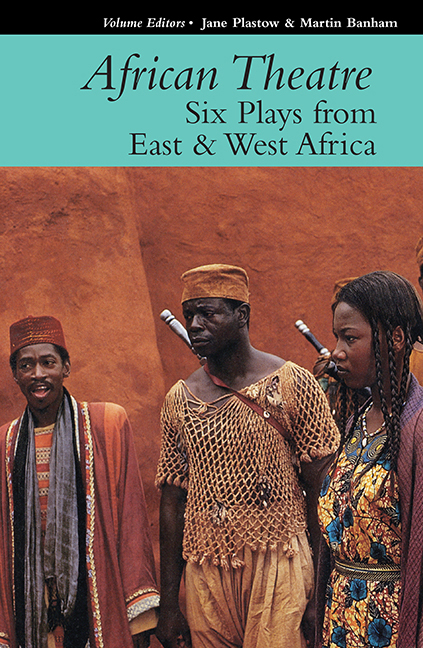Book contents
- Frontmatter
- Contents
- Notes on Contributors
- Obituary: Adieu Alain Ricard
- Preface
- THREE PLAYS FROM EAST AFRICA
- The translation & transcription of transcription of Mother Uganda & Her Children
- Mother Uganda & Her Children
- The context & making of Rose Mbowa's Mother Uganda & Her Children
- Majangwa: A Promise of Rains
- Notions of indigeneity: Uganda's Robert Serumaga
- The Guest (Engida): A One Act Play
- An Absurdist in Addis Ababa: Manyazewal Endeshaw's Engida
- THREE PLAYS FROM WEST AFRICA
- Book Reviews
Majangwa: A Promise of Rains
from THREE PLAYS FROM EAST AFRICA
Published online by Cambridge University Press: 24 August 2019
- Frontmatter
- Contents
- Notes on Contributors
- Obituary: Adieu Alain Ricard
- Preface
- THREE PLAYS FROM EAST AFRICA
- The translation & transcription of transcription of Mother Uganda & Her Children
- Mother Uganda & Her Children
- The context & making of Rose Mbowa's Mother Uganda & Her Children
- Majangwa: A Promise of Rains
- Notions of indigeneity: Uganda's Robert Serumaga
- The Guest (Engida): A One Act Play
- An Absurdist in Addis Ababa: Manyazewal Endeshaw's Engida
- THREE PLAYS FROM WEST AFRICA
- Book Reviews
Summary
CAST
Majangwa a worn-out drummer-entertainer
Nakirijja his wife, a former dancer
A crowd of villagers
Kintu, the leader
Nambi, his wife
Kayikuuzi, a strong man
Death
A man, a murderer
A girl, a cinema-goer
A boy, her companion
Act One
The stage is a roadside on the way to Mityana, thirty-nine miles from Kampala. The road runs across the stage so that the audience eavesdrops on the proceedings from a cliff (or is it a ditch?) on the other side of the road, opposite the side where the action takes place.
It is nearly dark. The sun is a few minutes gone now, but the moon and stars have not yet lit up the butt end of twilight, a kind of loose and largely unformed night. There are a few moments of calm and solitude. Then enters Majangwa in his traditionally recognisable attire complete with his mugalabi drum. He has obviously been walking for some distance. Equally obviously, he does not want to stop. He appears to have a pressing destination somewhere.
Something, however, behind him puts a break on his speed. But he presses on all the way across the stage. He stops, turns back and looks at the distance he has covered. There is a pause. He walks back a few paces. Stops. Then with a patience that has almost run out, he calls:
Majangwa Nakirijja! Nakirijja! Nakiriijja (No reply.) She must be miles behind me. (Pause. In quiet desperation) Nakirijja. (Pause.) This road is too lenient. Too free with itself. It should have rejected her the minute it set eyes upon her, tripped her and cast her into the path of some moving object. (Pause.) What a waste. Such a road – firm of muscle, flat-bellied, long, outstretched, waiting for the ravishing approach of the traveller's feet. And what does it get? Some old limping goat that can't keep up the pace. (Pause.) Nakirijja Ono!!
(No reply. Majangwa decides to stop – and wait. He takes the drum from his shoulder, contemplates it and then strikes a few, beats with the palm of his hand. It gives a high clear note.)
- Type
- Chapter
- Information
- African Theatre 16: Six Plays from East & West Africa , pp. 62 - 87Publisher: Boydell & BrewerPrint publication year: 2017

